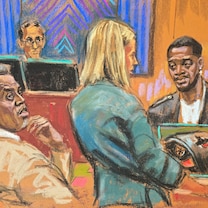Entwistle Due to Be Arraigned
Feb. 16, 2006 — -- Twenty-five days after leaving the country alone on a flight to London, Neil Entwistle has returned to the United States in handcuffs and shackles, this time escorted by U.S. marshals.
He faces murder charges in Massachusetts in the killings of his wife, Rachel Entwistle, and their 9-month-old daughter, Lillian Rose Entwistle, both of whom were shot with a .22-caliber gun that allegedly belonged to Rachel's stepfather.
Entwistle, 27, was turned over to police from Hopkinton, Mass., the suburban town where he had lived with his family. He met Wednesday night with Boston defense attorney Elliot M. Weinstein, who was appointed to represent him in the Massachusetts courts. Weinstein was assigned to the case by the Committee for Public Counsel Services, a state agency that pairs private lawyers with indigent defendants.
"We'll plead not guilty," Weinstein said. "From that moment forward, all of our efforts will be to see he receives the fairest of trials."
In recently released court affidavits, Rachel's stepfather, Joseph Materrazzo, told police that he last had used the weapon, which was kept locked away in his Carver, Mass., home, on Jan. 21, the day after Rachel and Lillian were apparently killed.
Materrazzo said he had used his firearms, including the .22 caliber, for target shooting.
This detail has raised concern that forensics on the alleged murder weapon may be less than perfect.
"I think the issue of time of death is going to be important," said defense attorney Janice Bassil. "DNA, fingerprints, I think all of those things are going to be very heavily focused on in this case."
Police say the motive is Entwistle's desperate financial situation: He was tens of thousands of dollars in debt.
The Middlesex district attorney suggested the plot might have been part of a failed murder-suicide. Court documents reported Entwistle said he "grabbed a knife from the kitchen and considered killing himself, but then put it down because it would hurt too much."





